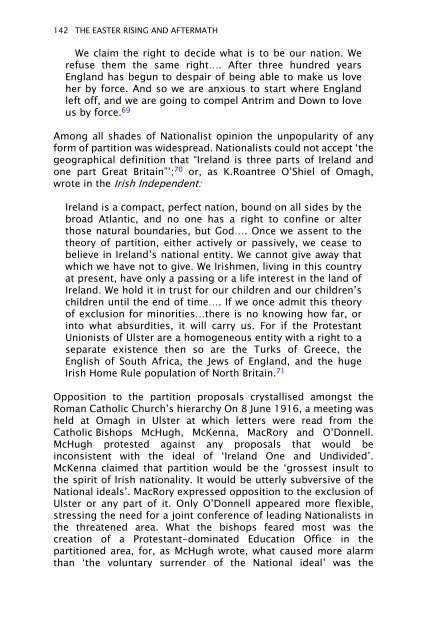Dividing Ireland: World War I and Partition
Dividing Ireland: World War I and Partition
Dividing Ireland: World War I and Partition
You also want an ePaper? Increase the reach of your titles
YUMPU automatically turns print PDFs into web optimized ePapers that Google loves.
142 THE EASTER RISING AND AFTERMATH<br />
We claim the right to decide what is to be our nation. We<br />
refuse them the same right…. After three hundred years<br />
Engl<strong>and</strong> has begun to despair of being able to make us love<br />
her by force. And so we are anxious to start where Engl<strong>and</strong><br />
left off, <strong>and</strong> we are going to compel Antrim <strong>and</strong> Down to love<br />
us by force. 69<br />
Among all shades of Nationalist opinion the unpopularity of any<br />
form of partition was widespread. Nationalists could not accept ‘the<br />
geographical definition that “<strong>Irel<strong>and</strong></strong> is three parts of <strong>Irel<strong>and</strong></strong> <strong>and</strong><br />
one part Great Britain”’; 70 or, as K.Roantree O’Shiel of Omagh,<br />
wrote in the Irish Independent:<br />
<strong>Irel<strong>and</strong></strong> is a compact, perfect nation, bound on all sides by the<br />
broad Atlantic, <strong>and</strong> no one has a right to confine or alter<br />
those natural boundaries, but God…. Once we assent to the<br />
theory of partition, either actively or passively, we cease to<br />
believe in <strong>Irel<strong>and</strong></strong>’s national entity. We cannot give away that<br />
which we have not to give. We Irishmen, living in this country<br />
at present, have only a passing or a life interest in the l<strong>and</strong> of<br />
<strong>Irel<strong>and</strong></strong>. We hold it in trust for our children <strong>and</strong> our children’s<br />
children until the end of time…. If we once admit this theory<br />
of exclusion for minorities…there is no knowing how far, or<br />
into what absurdities, it will carry us. For if the Protestant<br />
Unionists of Ulster are a homogeneous entity with a right to a<br />
separate existence then so are the Turks of Greece, the<br />
English of South Africa, the Jews of Engl<strong>and</strong>, <strong>and</strong> the huge<br />
Irish Home Rule population of North Britain. 71<br />
Opposition to the partition proposals crystallised amongst the<br />
Roman Catholic Church’s hierarchy On 8 June 1916, a meeting was<br />
held at Omagh in Ulster at which letters were read from the<br />
Catholic Bishops McHugh, McKenna, MacRory <strong>and</strong> O’Donnell.<br />
McHugh protested against any proposals that would be<br />
inconsistent with the ideal of ‘<strong>Irel<strong>and</strong></strong> One <strong>and</strong> Undivided’.<br />
McKenna claimed that partition would be the ‘grossest insult to<br />
the spirit of Irish nationality. It would be utterly subversive of the<br />
National ideals’. MacRory expressed opposition to the exclusion of<br />
Ulster or any part of it. Only O’Donnell appeared more flexible,<br />
stressing the need for a joint conference of leading Nationalists in<br />
the threatened area. What the bishops feared most was the<br />
creation of a Protestant-dominated Education Office in the<br />
partitioned area, for, as McHugh wrote, what caused more alarm<br />
than ‘the voluntary surrender of the National ideal’ was the








